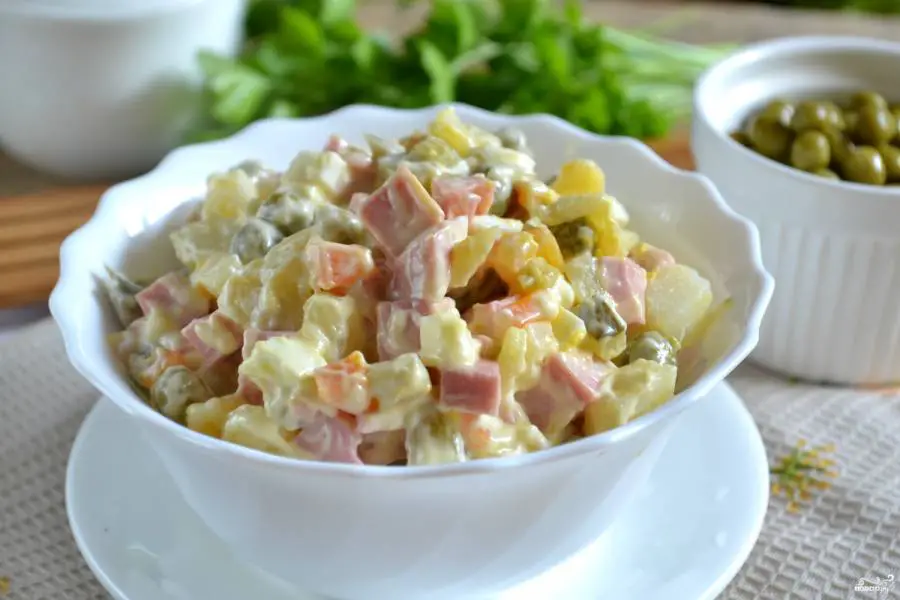Olivier Salad (Салат «Оливье») is a salad for which the recipe can vary widely, but which is typically made from chopped vegetables and meat in a mayonnaise base.
Invented in Moscow, the salad is now popular throughout the countries of the former Soviet Union and beyond. In places like Turkey, Iran, and Greece, it is eaten and often known as “Russian Salad” (Русский салат). In Russia, it is synonymous with holiday celebrations – traditionally made for New Year’s and nearly any other major event involving a large family meal.
How It Got Its Name
(Почему так называется?)
According to one legend, the salad is named “Оливье” (Olivier), because it was first made for the actor Sir Lawrence Olivier. The legend is absolutely false, but is a good way to remember how to pronounce the salad’s name: Olivier is pronounced in Russian and English the same as the legendary actor’s name.
The actual history is that the salad was invented in the 1860s and named for its creator, chef Lucien Olivier. This Belgian (who may have been originally French), ran a Parisian-style restaurant in Moscow called “Hermitage.”
The salad made his elite establishment one of the Russian capital’s most talked about and frequented establishments. “Оливье ревностно хранил рецепт как коммерческую тайну” (Olivier carefully guarded the recipe as a trade secret), always preparing it himself – and in fact took the recipe to his grave.
It survived via two derived sources. “Один рецепт был украден работником кухни” (One version was stolen by an employee) who was able to sneak a look at the work station while the great chef was called away. “Другой рецепт был создан одним из постоянных посетителей ресторана” (Another was developed by one of the restaurant’s regulars) who sought a way to keep the salad going after the chef was gone.
How to Prepare Olivier Salad
Как правильно готовить салат «Оливье»?
“Месье Оливье” (Monsieur Olivier) might be comforted (or terrified) to learn that the salad of today that still bears his name bears little resemblance to his original masterpiece.
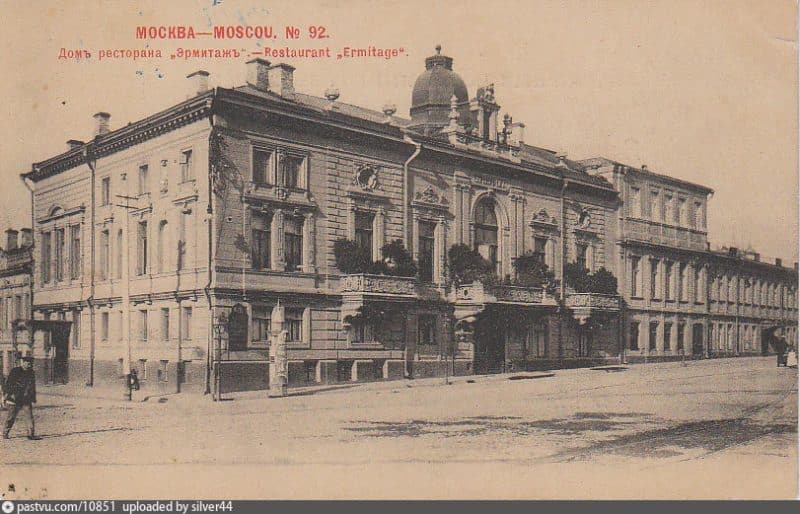
Olivier Salad was originally called «Майонез из дичи» (“Game Bird Mayonnaise”). It was made with a series of gourmet ingredients including black caviar and capers, layered together with steamed game hen, and bound in layers of jellied broth. Boiled crayfish tails and pieces of tongue were arranged around the edges of the dish and it was served covered with a small amount of fresh Provencal Sauce made from olive oil, egg yolks, French vinegar, mustard, and spices. A potato skin with gherkins and slices of boiled eggs decorated the center of the dish.
However, most Russian customers, Olivier noticed, would immediately mix the layers and garnish together and eat the mush thus created with a spoon. “Будучи шокированным, но желая угодить клиентам, предприимчивый повар начал подавать свой салат перемешанным и густо политым соусом” (Shocked, but willing to accommodate, the enterprising chef started serving his salad mixed together and bound in sauce rather than covered in it). This is also when the name changed to Olivier Salad.
“Современную версию блюда было бы правильно называть «советским оливье»” (The modern version of the dish could properly be called “Soviet Olivier”). During the Soviet period, “ингредиенты салата начали изменяться, поскольку некоторые из них стали недоступны” (the salad’s ingredients began to change as certain ingredients became rarer) in the planned economy or were deemed too bourgeois for the Soviet society.
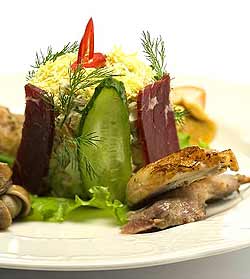
The caviar was dropped and the capers replaced with peas. “Рябчиков заменили курицей или ветчиной” (The game hen was substituted with chicken or ham). Then, as fresh meat became rarer, boiled meats and then sausage became the norm. Gherkins were replaced by more common pickles. Alternately, “поскольку майонез можно было купить в любом магазине” (as mayonnaise became available in stores), homemade Provence sauce was replaced with store-bought mayonnaise.
With these rapid mutations, by the late Soviet period, «Оливье» became a term applied to many diverse salads, whether it was made from canned fish, chicken, crab pieces, or other ingredients. For many, it became a way to prepare a small amount of “менее доступных ингредиентов” (rarer ingredients) such as meats or seafood with those that were “более доступными” (more commonly available) such as potatoes and mayonnaise.
“Под названием «Оливье» большинство россиян сегодня представляют «классическую советскую» версию” (Most Russians today will picture a “classic soviet” version of the salad) if asked to describe it. This version includes potatoes, hard-boiled eggs, peas, pickles and bologna, all in equal amounts, mixed with enough mayonnaise to bind the ingredients well.
Most often, any recipe for Olivier Salad that deviates from this short list of ingredients will be termed «Оливье с …» (“Olivier with…”) to indicate what unique element the recipe offers.
“Все ингредиенты режут на мелкие кубики, размером примерно с горошину” (all ingredients should be finely cubed into pieces about the size of a pea.)
Some chefs recommend a return to the use of Provencal sauce, or at least by adding mustard, vinegar, and a little olive oil to the mayonnaise before adding it to salad.
Marinated pickles (rather than salted pickles) are preferred. Some chefs also recommend replacing about a third of the pickles with fresh cucumbers “чтобы добавить салату свежесть” (to add “freshness” to the salad).
While the recipe is generally and historically flexible, most Russian chefs insist that adding carrots is heresy. This has likely arisen because another salad, “Салат «Столичный»” is usually made with carrots and is otherwise basically identical to Olivier Salad.
Incidentally, “Салат «Столичный»” is descended directly from the recipe stolen by Monsieur Olivier’s former employee. The thief rebranded it with that name. “Оба рецепта пережили схожие изменения в ходе своей истории” (Both recipes then went through similar changes as they lived out similar histories).
When and How to Eat Olivier Salad
(Как правильно есть салат «Оливье»?)

The symbolic meaning of Olivier Salad in Russian cuisine is significant, perhaps most comparable with stuffing in America. “Так же, как многие американцы не могут представить себе День Благодарения без хлебного начинки, большинство россиян не представляют себе Новый Год без салата «Оливье».” (Much like most Americans could not imagine a Thanksgiving without stuffing, most Russians could not imagine a New Year’s without Olivier Salad.) It often shares the table with another holiday staple salad – Селёдка под шубой (Herring under a Fur Coat).
“Первый канал” (First Channel), Russia’s most watched television channel, has even capitalized on this by christening its annual New Year’s variety show, which shows animation, songs, and sketch comedy all night, as «Оливье-шоу» (The Olivier Show). This show usually plays without commercial breaks – but with regular plugs for a general sponsor. In the past, this sponsor has often been, amusingly, a mayonnaise company.
Olivier Salad Recipes
(Давай Приготовим!)
See below for a free recipe for various Russian Olivier salads. You might also be interested in the following specialized cookbooks we’ve enjoyed:
 |
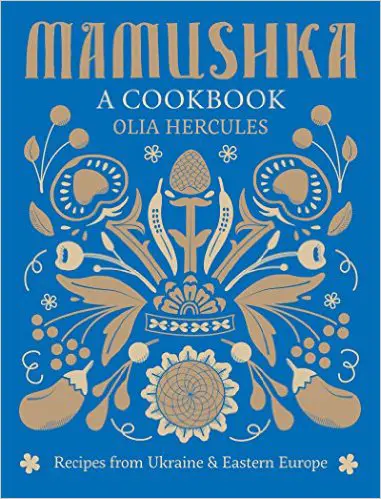 |
 |
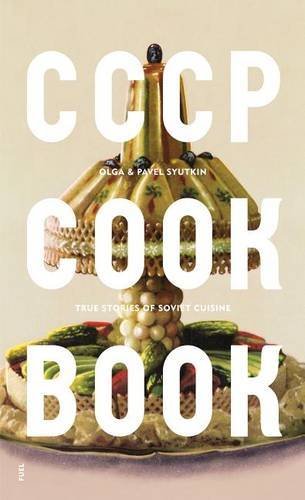 |
| Салат Оливье («советский» вариант) | Olivier Salad (“Soviet” version) |
Ингредиенты
*Все ингредиенты берутся в равных частях Приготовление Ингредиенты нарезать мелкими кубиками. Заправить майонезом. Добавьте по вкусу соль, перец, и свежий укроп, если надо. |
Ingredients
*All ingredients are used in equal amounts Preparation Chop up all the ingredients into small cubes. Mix in mayonnaise. Add fresh dill, salt and pepper to taste, if desired. |
| Салат Оливье («царский» вариант) | Olivier Salad (“Tsarist” version) |
| Вот рецепт «салата Оливье», приготавливаемого в лучшие времена в ресторане Эрмитаж (восстановленный в 1904 году по описаниям одного завсегдатая ресторана):
Ингредиенты
Заправка соусом «Провансаль»: 400 граммов оливкового масла взбитые с двумя свежими яичными желтками, с добавлением французского уксуса и горчицы. Приготовление Ингредиенты нарезать мелкими кубиками. Заправить соусом «Провансаль». |
This early recipe for Olivier salad, prepared during the height of the Hermitage restaurant’s popularity (this recipe was written out in 1904, according to the description of one of the restaurant’s frequent customers):
Ingredients
Provencal Sauce: beat 400 grams of olive oil with two egg yolks until light and smooth, then add French vinegar and mustard. Preparation Chop up all the ingredients into small cubes. Mix in the Provencal Sauce. |
Our Favorite Olivier Clips
This made-for-internet series, known as «Любимые рецепты с Натальей Скворцовой», is apparently done to advertise the mayonnaise brand «Московский Провансаль». Note that the host gives very little direction on how to actually prepare the salad – nearly the entire time is given over to the salad’s history. It is obviously assumed that most Russian-speaking viewers are already familiar with the preparation and likely more interested in a good narrative.
Another recipe for Olivier Salad – from a very calm, Russian-speaking woman who describes the process slowly and clearly.
You Might Also Like

Christianity and Paganism in Russia: Моя Россия Blog
In this text, Tajik blogger Roxana Burkhanova describes, in Russian, the history and current status of Christianity and paganism in Russia as well as touches upon issues of religious freedom. While Orthodox Christianity is the most popular and politically powerful religion in Russia, pagan traditions still survive and other Christian faiths exist. This is part […]

The Surprising Story of Russian Buddhism: Моя Россия Blog
In this text, Tajik blogger Roxana Burkhanova describes, in Russian, the history and current status of Buddhism in Russia. Buddhism is a small but historically important minority faith in Russia, especially in the Southern regions of Tuva, Buryatia, and Kalmykia. The material below details both the challenges that Buddhists have faced in integrating to wider […]

The Creation and Solution of Gender Problems in “Finist the Bright Falcon II,” a Russian Fairy Tale
As a child, I loved fairy tales, folklore, mythology, and anything that allowed me to escape into other worlds in which I could imagine having power and agency. I have hazy memories of the countless tales I devoured, and a still hazier understanding of how those tales may have played a role in my own […]

Religion in the USSR: Моя Россия Blog
In this text, Tajik blogger Roxana Burkhanova describes, in Russian, the history and religions under the USSR. Despite the state’s officially athiestic policies, multiple religions existed within the USSR. Since that empire’s demise, all of those religions are now experiencing a revival. The material below details how this came to pass. This is part of […]

Islam in Russia: Моя Россия Blog
In this text, Tajik blogger Roxana Burkhanova describes, in Russian, the history and current status of Muslims in Russia. Islam is the largest minority faith in Russia and Muslims are a growing and important demographic there, especially among immigrants from Central Asia. The material below details both the challenges that Muslims have faced in integrating […]

